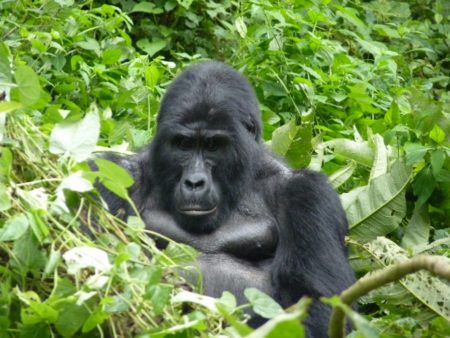
01 Mar Uganda — Gorillas in the Leaves
Partway up a mountain in the far west of Uganda is the lodge Diane Fosse slept in when she wanted human company, although that’s not much of an endorsement. Of all the things that woman is remembered for, sensuous self-indulgence is not among them.
We spent the night there, then rose before dawn and headed up a steep, muddy road through a cloud forest so filled with dripping ferns and ancient, moss-covered trees we might have wandered back into the Cretaceous.
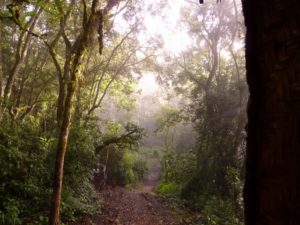
Into the Cretaceous
When the trees opened up we could look into mist-covered valleys nestled across the border in Congo. They were ancient and evocative and inexpressibly lovely
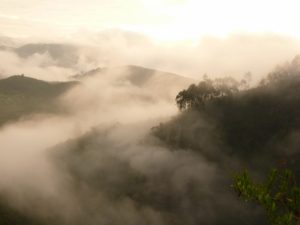
Of all the things we’d heard about Congo nobody mentioned how beautiful it is
At the end of the road was a ranger station where we met the people who would take us into the Bwindi Impenetrable Forest. The station wasn’t much bigger than a shed with more men waiting for us than you’d have guessed. A guide. A pair of scouts to run ahead to look for gorillas. A couple of guys with rifles in case we were attacked by forest elephants.
That seemed an odd thing to worry about. There were more elephants in Botswana where we lived, probably, than everywhere else on the planet put together, and Botswana guides don’t carry guns. They just pay attention to what they’re doing. I asked one of the guys with rifles how often they came across elephants. “Not recently,” he said. Sounding a lot like, “Not ever.” It crossed my mind that the rifles were really for poachers. Nobody wants to do time in a Ugandan prison and poachers were apt to shoot first and ask questions later. So, for that matter, were bands of armed rebels.
Another half-dozen guys were waiting to sign on as what, in the Nineteenth Century, would have been called bearers. Peggy and I each got one, even though we didn’t have anything to bear. Then we all hung around for a while to see if more tourists were going to show up. It wasn’t like nobody knew how many were coming. As with all important personages, you need an appointment to see gorillas and we’d made ours months before. It’s just that nobody back in Entebbe had taken the trouble to tell the people at the ranger station.
Peggy and I weren’t hoping for more people. To us, a private audience with gorillas sounded like just the ticket but it was pretty rough on the bearers who got turned away. They lived two valleys over, had roused themselves in the middle of the night, climbed a steep, muddy jungle path, crossed a very steep ridge, clambered down into the next valley, crossed over the next ridge and down into the valley at our feet, all before the sun came up. Then scrambled up eleven-hundred feet to where we were . . . for the chance to carry stuff for tourists whom nobody had bothered to tell them weren’t going to be there.
With water coursing down every time it rained, and the rain never really stopping, descending that trail was more like making our way down a streambed. Peggy and I were picking our way along, she balancing on a staff, me trying to keep my footing without one, when a lady with a pot of potatoes on her head breezed past. It was a big pot, the kind people do laundry in, wide at the top, made out of iron covered with ceramic, and looked like it held about forty pounds of potatoes.
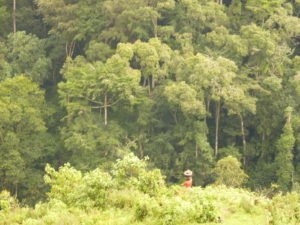
She has 40 pounds of potatoes on her head
When we’d descended about a third of the way the trail switched back and we glimpsed her again. She’d reached the valley, crossed over, and was halfway up the ridge on the far side. I’d guess she was in her late thirties, early forties, maybe.
As we approached the bottom, three more ladies passed us. They were older than the first one, and had sacks of meal on their heads. Sixty-pounds, easy, and were heading back up the way we came.
We came to a river down there. Not a huge river, but rushing and filled with rocks in a gorge we wouldn’t have wanted to fall into..
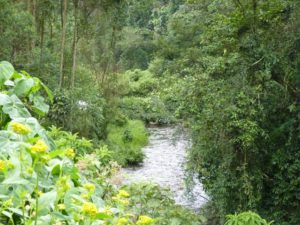
The impenetrable edge of the forest
We crossed by balancing along a slippery log. The bearers weren’t just there to bear, they were there to hold our hands and keep us from slipping off.
On the other side was the Bwindi Impenetrable Forest, the steepest jungle with the most enticing name I’ve ever clawed my way through. We grabbed at branches and vines and roots and pulled ourselves uphill for an hour or more until the trail gave out. By then, the scouts had found the gorillas and led us through denser trees and thicker roots and tanglier vines and slipperier mud until we came to a sunny place where the jungle gave way to leaves.
Leaves were everywhere, shrouding bushes and hanging like veils over trees. Undulating mounds of leaves covered rocks and logs and closed-in the view, a world of leaves Peggy and I were so busy picking our way through we almost walked into a gorilla. A solitary male was munching leaves, his huge pot belly nestled in so much foliage he looked as if he were floating away on a sea of green. To him, it must have felt like being in a field of cheeseburgers.
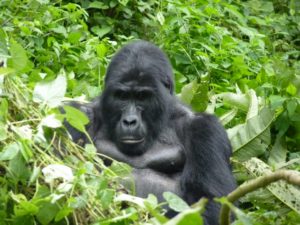
Gorilla among the cheeseburgers
Gazing back across millions of years of evolution, looking him in the eye, nothing about that gorilla was like looking at an animal. Peg and I both felt it. Maybe it was the calm way he regarded us, as if we were equals, I don’t know. But whatever it was, it was real. Somebody was there, somebody we knew. No wonder Diane Fosse went half-crazy trying to protect her gorillas from humans who imagined they had more in common with her than the gorillas she’d spent her life with.
He held out gaze for a moment, then tilted his head almost in a shrug, turned to the side and lolled back into the leaves.
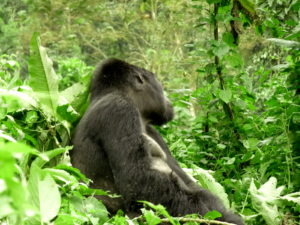
He’d seen a lot more humans, I think, than we’d seen gorillas
Whatever that gorilla was thinking about us, or not thinking about us, or thinking about leaves, one thing was pretty clear. We weren’t going in that direction anymore. We backed up and circled through the leaves and the sun until we came to a stand of small, white trees almost like aspen, or birch, an entire glade filled with leaves. A silverback was there.

Silver among the green
Females were there, too. And half-grown adolescents hassling each other, and babies. One tiny gorilla, as tiny as an untended baby could get, was perched in the top of a leaf-shrouded tree. He was the only one who paid any attention to us. He rose to his full, tiny height, and beat his chest. Imagining he was King Kong, perhaps. In a few decades he might really be. Then, like kids everywhere, succumbed to shyness and ducked down and put his hand over his eyes and made himself invisible.
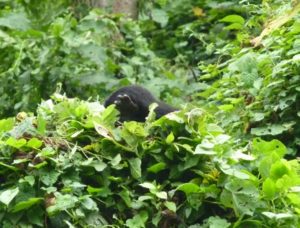
Invisible behind his hand
We watched for an hour, which was all we were allowed, then turned and headed downhill through mud and trees and roots and vines, teetered back across the log and sat down for lunch.
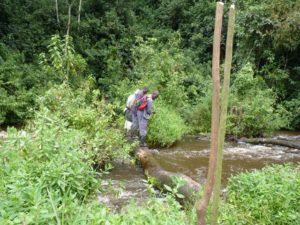
Teetering our way back across the river
One of the bearers handed us a bag with sandwiches and fruit and cookies, then went and sat with the others so that we wouldn’t be embarrassed by eating in front of them.
They didn’t have any food. These guys who’d gotten up in the middle of the night and crossed two ridges – mountain ranges by most standards – on the hope that somebody like Peggy and me would want them to carry sandwiches for us, these guys who were loose and funny, not even breathing hard, joking with each and too courteous to watch us eat, these guys didn’t have anything to eat.
The climb back out is something I remember in the same part of my brain where I keep the memories of the time I decided to pop down to the bottom of the Grand Canyon in August. Then, after sleeping on a sand bar in the Colorado River, realized I had to pop back out . . . on a side trail nobody had used since the silver mine up that way had played out. I was young, then, and in the best shape of my life and, still, I came close to not making it.
I was older when we climbed back up from that stream at the foot of the Impenetrable Forest, and not in terribly good shape, and I almost didn’t make it then, either. That’s when we discovered the bearers weren’t there just to keep us from falling off logs and carry our sandwiches, they’d bear us if the need arose.
“You have to do that often?” I asked when we staggered out at the top. “Carry people out?”
“You were lucky today,” the bearer grinned. “Gorillas were only two-and-a-half hours in.”
“Lucky?”
“Some people walk seven hours before they get to them.”
“Fourteen hours of . . . of . . .” I started to say.
“Fifteen,” he said. “If they want to spend time with the gorillas.”


No Comments